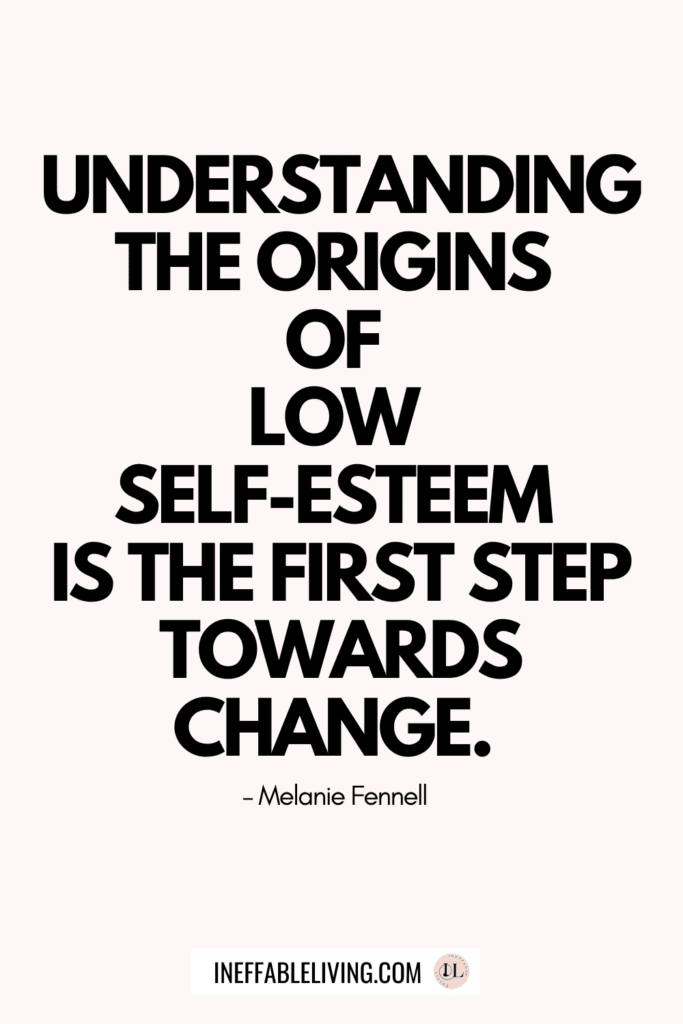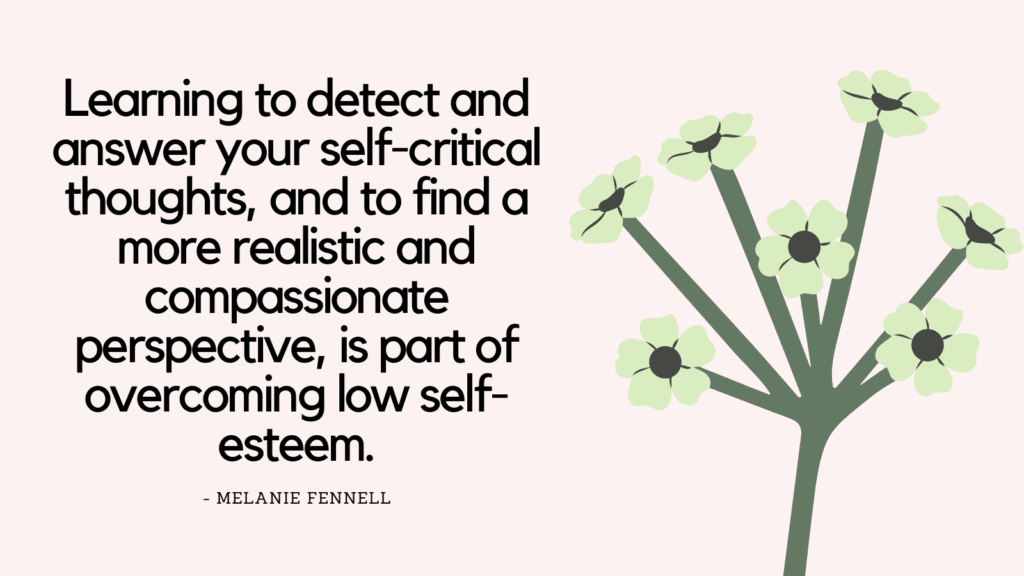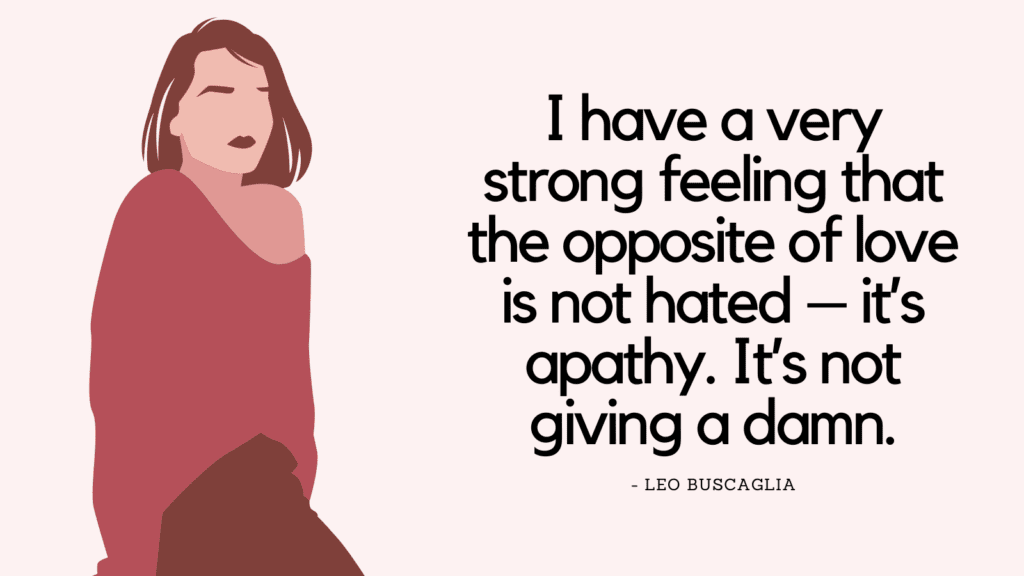This post contains some of the best females with low self-esteem quotes.
Signs of Low Self-Esteem In Females
Low self-esteem can affect individuals of all genders, but here are some signs that may be more commonly found in females:
1. Negative self-talk: Women with low self-esteem often engage in negative self-talk, criticizing themselves for their perceived flaws or mistakes.
2. Seeking validation: They may constantly seek validation and approval from others, as they don’t trust their own judgment and opinions.
3. Perfectionism: Women with low self-esteem may strive for perfectionism to prove their worth, leading to feelings of failure and inadequacy when they don’t meet their own high standards.
4. Difficulty setting boundaries: Women with low self-esteem might have difficulty setting boundaries, as they fear confrontation or rejection.
5. Self-neglect: They may neglect their own needs and prioritize the needs of others, as they don’t consider themselves worthy of care and attention.
6. Comparing themselves to others: Women with low self-esteem may constantly compare themselves to others and feel inferior or envious of their accomplishments.
7. Fear of criticism: They may avoid taking risks or speaking up due to fear of criticism or rejection from others.
It’s important to remember that everyone’s experience with low self-esteem can be different, and these signs are not definitive.
Females With Low Self Esteem Quotes
1. “In low self-esteem, your view of yourself isbiased heavily towards the negative – your flaws, your weaknesses, your mistakes, the times when you fall short. Your strengths, talents and good qualities tend to be ignored or discounted.” – Melanie Fennell
2. “Negative beliefs about yourself are the essence of low self-esteem. And this essence may have coloured and contaminated many aspects of your life.” – Melanie Fennell
3. “Low self-esteem is reflected in how a person acts in everyday situations. Look out for telltale clues like difficulty in asserting needs or speaking out, an apologetic stance, avoidance of challenges and opportunities. Look out too for small clues like a bowed posture, downturned head, avoidance of eye contact, hushed voice and hesitancy.” – Melanie Fennell
4. “Low self-esteem has an impact on emotional state. Look out for signs of sadness, anxiety, guilt, shame, hopelessness, frustration and anger.” – Melanie Fennell
Related: Top 18 Self Esteem Exercises (+FREE CBT For Self-Esteem Worksheets PDF)
5. “Just as low self-esteem is reflected in many aspects of the person, so it has an impact on many aspects of life. This in turn may feed into even lower self-esteem.” – Melanie Fennell
6. “People with low self-esteem find it hard to give themselves credit for their achievements, or to believe that their good results are the outcome of their own skills and strengths. They may drop out of school early without qualifications – and later on, this impacts on working life. They may end up earning less and spending more time unemployed.” – Melanie Fennell
7. “In their relationships with others, people with low self-esteem may suffer acute (even disabling) self-consciousness, over sensitivity to criticism and disapproval, excessive eagerness to please – even outright withdrawal from any sort of intimacy or contact.” – Melanie Fennell
8. “People with low self-esteem may avoid any activity in which there is a risk of being judged (art classes, for example, or competitive sports), or may believe that they do not deserve rewards or treats or to relax and enjoy themselves.” – Melanie Fennell

9. “People with low self-esteem may not take proper care of themselves. They may struggle on when they feel ill, put off going to the hairdresser or the dentist, not bother to exercise or eat a healthy diet, rarely buy new clothes, drink excessively or smoke or use street drugs. Or, in direct contrast, they may spend hours perfecting every detail of how they look, convinced that this is the only way to be attractive to other people.” – Melanie Fennell
Related: How Confident Am I Quiz (+Best 13 Practical Tools To Feel More Confident)
10. “Loss of self-esteem is sometimes a consequence of some other problem which causes distress and disruption in a person’s life. Long-standing anxiety problems, for example, such as constantly worrying or apparently uncontrollable panic attacks, can impose real restrictions on what a person can do, and so undermine confidence and lead to feelings of incompetence and inadequacy.” – Melanie Fennell
11. “Sometimes low self-esteem, rather than being an aspect or consequence of current problems, seems in fact to be the fertile soil in which they have grown. It may have been in place since childhood or adolescence, or as far back as the person can remember.” – Melanie Fennell
12. “ If you have low self-esteem, however, then you are likely to see minor disruptions in your performance as evidence of your usual uselessness, incompetence or whatever. That is, they say something about you as a person. ” – Melanie Fennell
13. “At the heart of low self-esteem lie negative beliefs about the self. These may seem like statements of fact, in the same way that your height and weight and where you live are facts. Unless you are lying (e.g. you would like people to think you live in a more desirable part of the city) or not in possession of the information you need to give an accurate account (e.g. you have only just moved to a new home and have trouble recalling the address), then statements of fact like these are indisputable – and, indeed, their truth can easily be checked and verified by you and other people.” – Melanie Fennell
Related: Best 35 Journal Prompts To Get To Know Yourself
14. “Another more subtle experience that can contribute to low self-esteem is the experience of being the ‘odd one out’. I mean by this being someone who did not quite ‘fit’ in your family of origin. Perhaps you were an artistic child in an academic family, or an energetic, sporty child in a quiet family, or a child who loved reading and thinking in a family who were always on the go. Or perhaps you realised as you grew up that your sexual orientation might not be accepted or approved of by your more conventional parents and siblings.” – Melanie Fennell
15. “Understanding the origins of low self-esteem is the first step towards change.” – Melanie Fennell
16. “Low self-esteem sets you up to notice anything that is consistent with your negative ideas about yourself. You are swift to spot anything about yourself that you are unhappy about or do not like. This may mean aspects of your physical appearance (e.g. your eyes are too small), your character (e.g. you are not outgoing enough) or simply mistakes that you make (‘Not again. How could I be so stupid?’) or ways in which you fall short of some standard or ideal (e.g. not performing 110 per cent on an assignment). All your shortcomings, flaws and weaknesses jump out and hit you in the face.” – Melanie Fennell
17. “Low self-esteem not only skews your perception of yourself, but also distorts the meanings you attach to what you see. If something does not go well, you are likely to use this as the basis for a global, overgeneralised judgement of yourself – typical, you always get it wrong, etc.” – Melanie Fennell
18. “Biases in your thinking about yourself (prejudices against yourself) keep your negative views in place, make you anxious and unhappy, restrict your life and prevent you from searching out a kinder, more compassionate, more balanced, accepting and accurate view of the person you really are.” – Melanie Fennell
Related: How To Stop Self-Critical Thoughts Using These Top 10 Techniques
19. “When a person with low self-esteem is confronted with speaking in public, what immediately springs to mind will be all the ways in which things could go wrong. He or she will probably assume that the worst will happen, and that there is little or nothing that can be done to prevent it.” – Melanie Fennell
20. “So avoidance, although it may help you feel better in the short term (what a relief – you got out of it), ultimately contributes to the continuation of low self-esteem.” – Melanie Fennell
21. “If you have low self-esteem, however, then you are likely to see minor disruptions in your performance as evidence of your usual uselessness, incompetence or whatever. That is, they say something about you as a person. In effect, you are expecting yourself to be superhumanly perfect.Naturally enough, this also helps to keep low self-esteem going.” – Melanie Fennell
22. “Research has shown that low self-esteem (lasting negative beliefs about the self) may contribute towards a range of difficulties, including depression, suicidal thinking, eating disorders, substance abuse and social anxiety (extreme shyness).” – Melanie Fennell
23. “ Even when things go well, low self-esteem can undercut your pleasure in what you achieve and make you likely to ignore, discount or disqualify anything that does not fit with your prevailing negative view of yourself.” – Melanie Fennell
Related: What Causes Cognitive Distortions? (+Top 10 Common Cognitive Distortions & How To Challenge Them)
24. “ Self-critical thoughts, like anxious predictions, have a major impact on how we feel and how we deal with our lives. They contribute to keeping low self-esteem going.” – Melanie Fennell
25. “Learning to detect and answer your self-critical thoughts, and to find a more realistic and compassionate perspective, is part of overcoming low self-esteem.” – Melanie Fennell
26. “ Low self-esteem makes it hard to make realistic predictions or to act on them with an open mind. When people with low self-esteem make predictions about themselves (e.g. ‘I won’t be able to cope’, ‘Everyone will think I’m an idiot’, ‘If I show my feelings, they will reject me’), they tend to treat them as facts, rather than as hunches which may or may not be correct.” – Melanie Fennell
27. “ People with low self-esteem are hard on themselves. For them, self-criticism may be more or less a way of life. They call themselves names, tell themselves they should do better and put themselves down whenever things go wrong. They are on the lookout for every little weakness and mistake. These are not a part of normal frailty or natural human error – they are evidence of inadequacy or failure, a sign that they are simply not good enough.” – Melanie Fennell
28. “People with low self-esteem criticise themselves for all the things they should be doing and aren’t – and for all the things they should not be doing and are. They may even criticise themselves for being so critical.” – Melanie Fennell
29. “Part of overcoming low self-esteem is to begin to notice and take pleasure in your achievements and in the good things in your life.” – Melanie Fennell
30. “An important part of overcoming low self-esteem is to begin to view your weaknesses and flaws – the things you do not do particularly well and the mistakes you make – as simply part of being a normal, imperfect human being, rather than a reason for condemning yourself as a total person.” – Melanie Fennell
Related: Top 21 Emotional Writing Prompts To Process Emotions

How to Overcome Low Self-Esteem?
Low self-esteem can feel like a heavy weight, holding you back from living a fulfilling and empowered life. However, it’s possible to challenge and change negative beliefs about yourself. Here’s how to start building self-esteem, one step at a time.
1. Identify the Source
Low self-esteem often stems from past experiences, criticism, or unmet expectations. Take time to reflect on where your feelings of inadequacy began. Understanding the root can help you challenge its impact on your current life.
2. Challenge Negative Self-Talk
Pay attention to the way you talk to yourself. Replace thoughts like, “I always fail,” with more balanced statements like, “I’m learning and improving.” Practice self-compassion by speaking to yourself as you would a supportive friend.
3. Set Achievable Goals
Start with small, realistic goals that align with your values. Completing even minor tasks can build your confidence and show you that you’re capable. Celebrate every win, no matter how small—it all adds up!
4. Focus on Your Strengths
Make a list of your skills, accomplishments, and qualities you admire about yourself. If this feels hard, ask trusted friends or family members what they appreciate about you. Reflect on this list often to remind yourself of your worth.
5. Surround Yourself with Positivity
Spend time with people who uplift and support you. Distance yourself from relationships that make you feel small or unworthy. Positive environments encourage growth and reinforce your sense of value.
6. Practice Self-Care
Caring for your physical and emotional well-being sends a powerful message to yourself: “I matter.” Eat nutritious meals, get enough sleep, and engage in activities that bring you joy. Prioritize routines that nurture your overall health.
7. Stop Comparing Yourself
Comparing yourself to others often worsens self-esteem. Remember, everyone’s journey is different. Focus on your progress and how far you’ve come, rather than measuring yourself against someone else’s achievements.
8. Learn to Accept Compliments
If you tend to deflect compliments, practice saying “thank you” instead. Accepting kind words helps rewire your brain to see yourself in a more positive light. Let others’ affirmations reinforce your self-worth.
9. Develop New Skills
Learning something new can be empowering. Whether it’s cooking, painting, or coding, building competence in an area you enjoy boosts confidence. Embrace the process of growth, not just the results.
10. Set Boundaries
Healthy self-esteem involves saying “no” to things that drain your energy or violate your values. Protect your time and well-being by setting boundaries in relationships, work, and commitments.
11. Practice Gratitude
Focusing on the positives in your life can shift your perspective. Write down three things you’re grateful for each day, including qualities or achievements you’re proud of. Gratitude fosters a sense of abundance and self-acceptance.
12. Seek Professional Support
A therapist can help you explore the underlying causes of low self-esteem and provide tailored strategies for improvement. Therapy offers a safe space to work through insecurities and develop healthier thought patterns.
13. Visualize Your Best Self
Imagine the person you want to become—confident, happy, and self-assured. Visualizing this version of yourself helps create a mental roadmap to embody those qualities in your daily life.
14. Be Patient with Yourself
Improving self-esteem is a gradual process. There will be ups and downs, but persistence is key. Treat setbacks as opportunities to learn rather than reasons to give up.
Final Thoughts
Overcoming low self-esteem requires practice and self-awareness, but the journey is worth it. By taking small, consistent steps, you can transform the way you see yourself and build a foundation of confidence that lasts. Believe in your potential—you are more capable and deserving than you realize.



